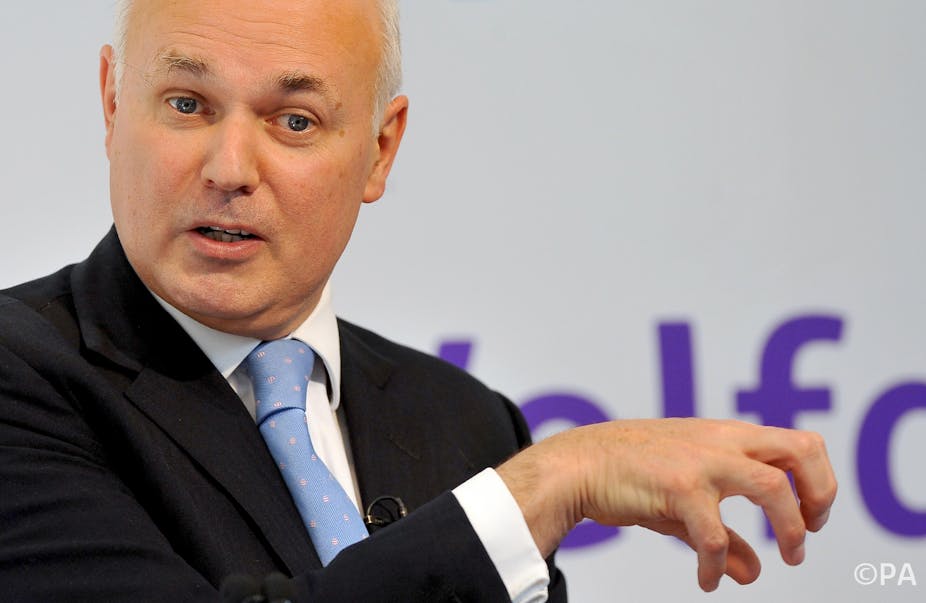The coalition government tells a story of “broken Britain”. Welfare spending is out of control. It is unaffordable. It is excessively generous. It undermines incentives because people are better off not working. It promotes long-term dependency. The press coverage, and supportive polls, suggest that many people have found this narrative compelling. However, it isn’t true.
The first claim is that welfare spending is out of control. Two thirds of Department for Work and Pensions (DWP) benefits go to pensioners, and despite the slump older people still account for nearly all the projected rise in costs. This rise is both predictable and sustainable.
Next is the claim that spending on people of working age is “unaffordable.” In 1992/93 DWP benefits for people of working age took up 4.3% of national income. In 2012/13 the equivalent figure will be 3.5%. The main increase in the last 20 years has been support for people who are in work, through Tax Credits.
“People found they are better off on the dole than in work.” That statement comes from George Osborne. The level of benefit given to unemployed people to replace their salary - the “replacement ratio” - is markedly lower in the UK than in most other developed countries. Tim Vlandas at the LSE reports that the figure for the UK is 0.19 of previous salary. In the USA it’s 0.28, in Germany 0.35, in Canada 0.46, in Denmark 0.52, in Switzerland 0.69.
“Welfare dependency can become deeply entrenched, handed on from one generation to the next”. This is a persistent myth, unsupported by the extensive evidence. The main long-term dependency among people of working age is for people who are severely disabled; the number of unemployed people who are continuously out of work is tiny. There is little continuity in one generation, let alone in successive ones.
Lastly, the claim has been made that the system is absurdly generous. The benefit cap gives the misleading impression that there is a problem of excessive payments. There are 4.8 million claimants of housing benefit; the cap is estimated to affect 40,000. The basic welfare allowance for two adults over 25 is £112.55 per week. Housing benefit puts up the nominal figures, but that money goes to landlords, not to claimants.
Misinformation
The criticism of benefits has been backed with a salvo of misinformation. The government has been taken to task for a series of breaches of the Code of Practice for official statistics. Here are some examples:
- The DWP failed to make material on “welfare to work” open in the way required of official statistics, which led to a note of concern from the chair of the UK Statistics Authority (UKSA).
- The release of statistics on foreign claimants was criticised by the UKSA as “highly vulnerable to misinterpretation”.
- The Chair of the Commons Work and Pensions Committee took up the minister in these terms: “I am sure that you are therefore as shocked as I am by this most recent misrepresentation of DWP statistics …”
- Claims were made concerning the effect of the benefit cap in persuading people into work. The Chair of the UKSA wrote to work and pensions secretary Iain Duncan Smith: “In the manner and form published, the statistics do not comply fully with the principles of the Code of Practice, particularly in respect of accessibility to the sources of the data, information about the methodology and quality of the statistics, and the suggestion that the statistics were shared with the media in advance of their publication.”
How to be misled
There are many reasons why a government might use misleading statistics. It might be done because people don’t understand the figures they’re referring to. For example, benefits for long term sickness did not have a surge in claims in the late 90s - the way figures were kept was revised. It might happen because there are alternative versions of the truth: for example, total expenditure on benefits is sometimes given as DWP benefits in Great Britain, DWP benefits in the UK (which is £5bn more), or DWP + Child Benefit + Tax Credits. And it might happen deliberately. There is always a risk that, in their enthusiasm for “spin” and a natural tendency to select supportive evidence, politicians might overstep the mark. Some of the statements emanating from government ministers are wrong and, in some cases, we don’t know where the figures come from, or if they mean anything.
However, to show that a misrepresentation is deliberate - that someone is lying - we would have to be able to show that they really knew what they were saying was untrue when they said it. The wilder and more unreasonable the statement, the harder that is to prove.

